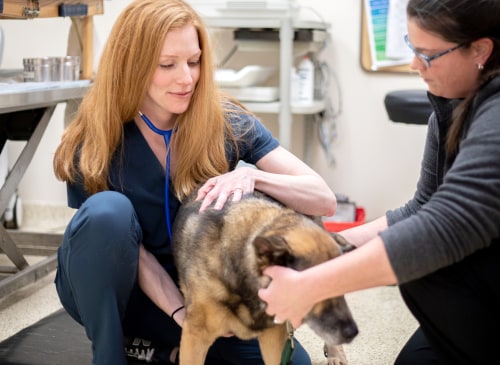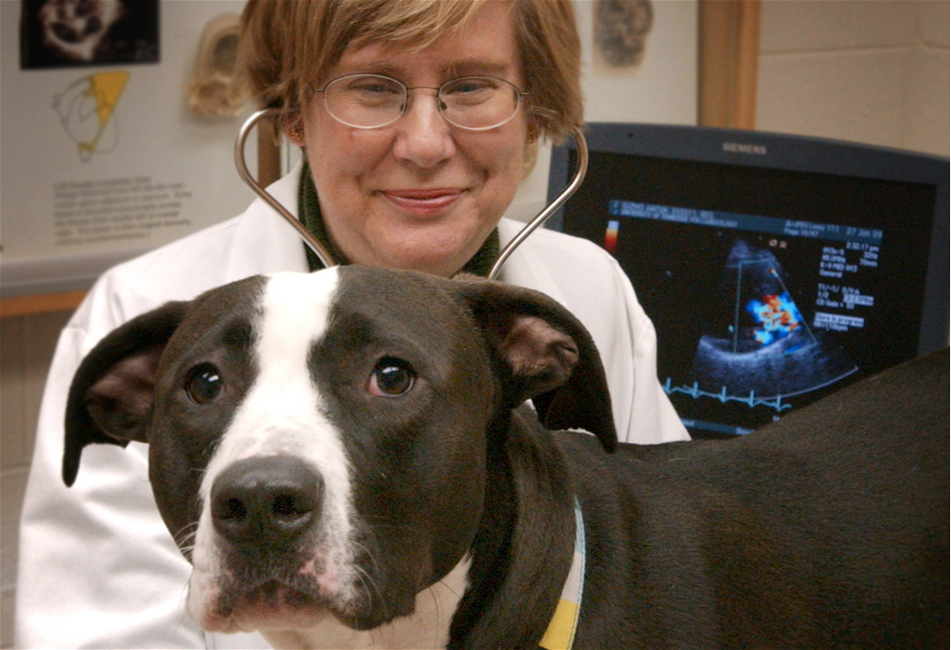Complete Preparation Tips Before Scheduling CT Scans For Animals}
Wiki Article
Checking Out the Vital Solutions Offered by a Vet Cardiologist: Understanding Ultrasound and CT Check Methods
Vet cardiologists play a crucial function in the health and wellness of animals by identifying and treating various heart disease. They make use of sophisticated imaging techniques, such as heart ultrasound and CT scans, to supply precise analyses. Each technique has its distinct advantages and applications. Recognizing these methods is important for pet proprietors seeking the ideal care for their companions. What variables should family pet owners take into consideration when selecting between these analysis devices?
The Duty of Vet Cardiologists in Animal Medical Care
Veterinary cardiologists play an essential function in the healthcare of family pets, concentrating specifically on diagnosing and dealing with heart-related problems. They have specialized training that enables them to translate complicated analysis examinations and identify different cardio concerns. These experts use sophisticated methods, such as echocardiography and electrocardiography, to analyze heart function and structure accurately.Veterinary cardiologists also establish customized therapy strategies that may consist of drugs, lifestyle alterations, and, sometimes, medical treatments. Their know-how reaches informing family pet proprietors regarding heart wellness, stressing the relevance of normal exams and early detection of potential problems. Collaboration with general veterinarians is vital, as it guarantees complete look after family pets with presumed heart problems. By providing specialized services, veterinary cardiologists greatly enhance the lifestyle for pets and offer peace of mind for their proprietors, strengthening the importance of heart health and wellness in general animal health.Common Cardiac Problems in Animals
Common cardiac concerns in family pets can considerably affect their health and quality of life. Heart murmurs, numerous types of cardiomyopathy, and hereditary heart defects are amongst one of the most common conditions that veterinarians run into. Cancer Veterinary Near Me. Recognizing these concerns is necessary for pet proprietors to guarantee prompt medical diagnosis and ideal treatmentHeart Murmurs in Pets
Heart murmurs can be a resource of concern for pet dog owners, they are not constantly a sign of significant health problems. A heart whispering is an unusual audio generated by unstable blood circulation within the heart. In pets, these whisperings can be brought on by numerous aspects, including genetic heart defects, shutoff problems, or perhaps stress during examinations. Many pet dogs with heart whisperings lead normal lives without considerable health influences. To establish the underlying reason, veterinary cardiologists usually utilize diagnostic techniques such as echocardiograms and Doppler ultrasounds. Early discovery and analysis are necessary, as they may aid take care of any kind of potential cardiac issues effectively. Pet owners are motivated to consult their vet for a comprehensive assessment if a heart whispering is spotted.Cardiomyopathy Types Explained
Cardiomyopathy encompasses a group of illness impacting the heart muscle mass, resulting in compromised heart feature in pet dogs. The most usual types consist of expanded cardiomyopathy (DCM), hypertrophic cardiomyopathy (HCM), and limiting cardiomyopathy (RCM) DCM mostly impacts pets, triggering the heart to weaken and expand, which reduces its capacity to pump blood successfully. On the other hand, HCM is a lot more common in felines, identified by the thickening of the heart walls, frequently leading to obstructed blood circulation. RCM, though less common, happens when the heart muscular tissue comes to be inflexible, limiting its ability to loaded with blood. Each type provides special obstacles in medical diagnosis and treatment, requiring specialized vet cardiological examination to ensure peak monitoring and look after affected pet dogs.Congenital Heart Flaws
Hereditary heart defects represent a substantial category of heart problems in pet dogs, distinctive from acquired problems such as cardiomyopathy - Cancer Veterinary Near Me. These flaws are architectural irregularities existing at birth, influencing the heart's normal feature. Typical types include license ductus arteriosus, ventricular septal flaws, and pulmonic constriction. Symptoms might differ commonly, varying from light to extreme, and can include workout intolerance, coughing, and difficulty breathing. Early medical diagnosis through sophisticated imaging techniques like ultrasound is vital for efficient management. Vet cardiologists play an important function in recognizing these conditions and recommending appropriate therapy alternatives, which may consist of medical administration or medical intervention. Recognizing congenital heart problems permits better end results and boosted lifestyle for affected family petsComprehending Cardiac Ultrasound: Just How It Functions
A substantial variety of veterinary practices currently utilize heart ultrasound as an essential diagnostic device for examining heart health in pets. This non-invasive technique makes use of original site high-frequency sound waves to create photos of the heart's framework and function. Throughout the treatment, a veterinary specialist applies a gel to the animal's breast and uses a transducer to produce ultrasound waves. These waves jump off the heart and bordering frameworks, creating real-time photos on a monitor.Veterinarians can assess various aspects of heart wellness, consisting of chamber dimension, wall motion, and shutoff feature. Furthermore, heart ultrasound permits for the detection of irregularities such as fluid buildup and hereditary heart flaws. This strategy is essential for diagnosing problems that may not show up via standard radiographs. By supplying detailed information regarding the heart's anatomy and efficiency, cardiac ultrasound aids in creating efficient treatment prepare for animals struggling with heart illness.The Relevance of CT Scans in Diagnosing Heart Conditions
Exactly how do CT scans boost the medical diagnosis of heart conditions in veterinary medication? CT scans provide detailed cross-sectional photos of the heart and surrounding structures, enabling veterinarians to picture complicated anatomical partnerships. This click now imaging method is especially valuable in determining hereditary heart problems, cardiac tumors, and problems in blood vessels. By utilizing advanced imaging algorithms, CT scans can assess heart chamber dimensions and function, offering a comprehensive sight that may be difficult to accomplish with typical methods.Additionally, CT angiography can picture blood flow and determine areas of constriction or blockage, which is crucial for planning possible interventions. The rate and accuracy of CT scans also promote fast diagnoses, important in emergency situation scenarios. Ultimately, the unification of CT checks right into vet cardiology significantly improves the precision of medical diagnoses, allowing targeted therapy strategies and enhancing person results for animals experiencing heart problems.Contrasting Ultrasound and CT Check Techniques
While both ultrasound and CT scans are important devices in vet cardiology, they provide unique benefits and constraints that influence their use in identifying heart conditions. Ultrasound, or echocardiography, offers real-time imaging of the heart's structure and feature, enabling veterinarians to evaluate heart chambers, valves, and blood circulation. It is especially efficient for reviewing problems like coronary infarction and cardiomyopathy. Ultrasound might be limited in imagining specific physiological frameworks due to individual dimension or obesity.In comparison, CT scans offer detailed cross-sectional images of the heart and surrounding tissues, making them perfect for identifying structural problems, lumps, or vascular concerns. Although CT scans give thorough insights, they call for sedation and may entail radiation direct exposure. Ultimately, the selection between ultrasound and CT scans depends upon the certain clinical scenario, the client's problem, and the info needed for an exact medical diagnosis.Therapy Choices Readily Available With Vet Cardiology
Vet cardiology provides a series of therapy choices tailored to attend to various heart conditions in animals. Treatment plans typically begin with lifestyle modifications, consisting of diet regimen adjustments and exercise adjustments, focused on enhancing overall heart health and wellness. Drugs play a crucial role, with cardiologists recommending medicines such as diuretics, beta-blockers, and ACE preventions to improve and manage signs and symptoms cardiac function.In more severe cases, interventional treatments, such as balloon valvuloplasty or stent positioning, might be essential to ease blockages or enhance blood circulation. For specific genetic heart problems, surgical alternatives might be explored to deal with structural concerns. Furthermore, ongoing monitoring and follow-up treatment are crucial components of a complete treatment plan, see page enabling timely modifications based upon the animal's response to treatment. In general, veterinary cardiology concentrates on supplying effective, individualized treatment to enhance the health and health of pet clients with heart conditions.Just how to Prepare Your Animal for a Cardiac Assessment
Preparing a family pet for a cardiac assessment is important to guarantee accurate outcomes and a smooth procedure. Owners need to first set up the visit with the veterinary cardiologist and review any type of details needs or concerns. It is advisable to withhold food for at the very least 12 hours before the evaluation, as this helps boost imaging quality during procedures like ultrasound or CT scans.Additionally, preserving a calm atmosphere on the day of the visit can help in reducing the pet dog's anxiousness. It is beneficial to bring along any relevant medical records, consisting of previous tests and medicines (CT Scans For Animals). Owners must also ensure that their family pet is comfy and leashed during transportation to the facility. Finally, familiarizing themselves with the evaluation process can ease concerns and help in asking educated concerns during the examination. By adhering to these steps, owners can contribute considerably to the performance of the heart evaluationRegularly Asked Concerns
How much time Does a Heart Ultrasound or CT Scan Take?
The period of a heart ultrasound commonly varies from 30 to 60 minutes, while a CT scan might take around 15 to thirty minutes. Variables such as the individual's condition can affect these time price quotes.
Exist Any Type Of Risks Related To These Diagnostic Treatments?

Can I Stick With My Pet Dog Throughout the Treatment?
The veterinary facility's plan typically determines whether family pet proprietors can stay during treatments. While some facilities motivate owner presence for convenience, others might need splitting up to guarantee safety and ideal problems for analysis imaging.Exactly how Much Do These Diagnostic Examinations Normally Expense?
The costs of analysis tests, such as ultrasound and CT scans, typically differ based upon location and center. Normally, costs range from a couple of hundred to over a thousand dollars, mirroring the intricacy and technology involved.
What Is the Recovery Process After a Cardiac Assessment?
The recovery process after a cardiac examination involves checking the family pet for any instant reactions, making sure convenience, and limiting physical activity. Veterinarians commonly offer post-evaluation directions to direct animal owners throughout this crucial healing period. Heart whisperings, various types of cardiomyopathy, and genetic heart problems are amongst the most prevalent problems that veterinarians come across. A heart whispering is an unusual sound created by stormy blood flow within the heart. Cardiomyopathy incorporates a group of illness influencing the heart muscle, leading to endangered cardiac function in family pets. Congenital heart problems represent a substantial classification of heart problems in pets, distinct from obtained problems such as cardiomyopathy. Ultrasound, or echocardiography, provides real-time imaging of the heart's structure and feature, permitting vets to evaluate heart chambers, shutoffs, and blood circulation.Report this wiki page